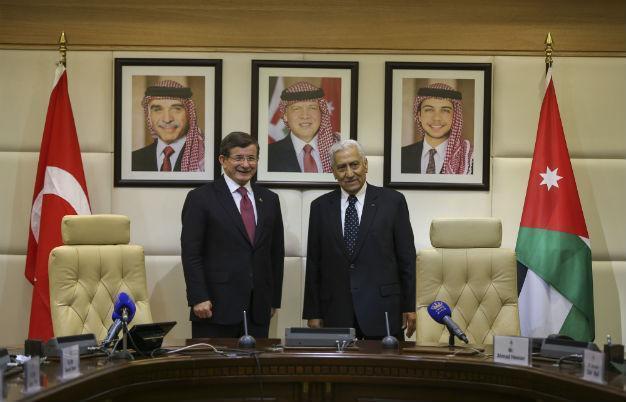Turkey, Jordan boost ties amid Syrian crisis
Serkan Demirtaş – AMMAN

AA photo
Turkey and Jordan, the two regional countries suffering the most from the growing Syrian refugee crisis, have vowed to boost ties in various fields, with expectations that the five-year long Syrian tragedy will soon come to a peaceful end.Turkish Prime Minister Ahmet Davutoğlu, accompanied by Turkey’s foreign, industry, transportation and water ministers, paid a two-day trip to Amman to sign a score of agreements to boost bilateral ties with Jordan, as well as exchange views on the ongoing Syrian problem.
At a joint press conference with his host, Davutoğlu said Turkey and Jordan supported the cessation of hostilities in Syria as well as the termination of the crisis in the neighboring country. “The ferocity of terrorist organizations like Daesh [the Islamic State of Iraq and the Levant - ISIL], the YPG [the armed wing of the Democratic Union Party - PYD] and the PKK [the outlawed Kurdistan Workers’ Party] is not just an attack targeting our countries but also regional stability,” he said.
Expressing Turkey’s wish for the successful completion of the Geneva talks aimed at ending the Syrian crisis through diplomatic means, the Turkish prime minister said, “We want to see that the territorial integrity of Syria and Iraq is protected.”
Describing the ties between Turkey and Jordan as a perfect example of a regional relationship, Davutoğlu underlined Turkey has been in favor of developing economic relations along with political priorities. “Thanks to the free trade agreement we have signed, our trade volume has doubled and reached a level of $1 billion. 2017 will mark the second phase of this agreement. I am sure this will bring about new momentum to our trade ties,” he stressed.
One potential cooperation area is the launch of Ro-Ro transportation between the ports of Iskenderun in southern Turkey and Aqaba in Jordan. “The Aqaba port is strategically important for us. We want to take advantage of Ro-Ro transportation between Iskenderun and Aqaba in the aftermath of the crisis in Syria and Iraq,” Davutoğlu stated.
Following a meeting between the two countries’ delegations under the leadership of Davutoğlu and his host, Jordanian Prime Minister Abdullah Ensour, the two countries signed 10 different agreements on March 27.
The agreements envisaged deepening cooperation in the fields of labor, employment, trade policies, protection and promotion of mutual investments, meteorology, forestry and air transportation. Jordan’s Petra and Turkey’s Anadolu Agency news agencies also signed a protocol over news exchange and cooperation.
After the meeting at the prime minister’s office, Davutoğlu met with King Abdullah before addressing the Turkey-Jordan Business Forum and a conference held by a Jordan-based think tank.
During the visit Davutoğlu also inaugurated the opening of the Turkish Cooperation and Coordination Agency (TİKA) office in Amman.
Turkey and Jordan have always been in close dialogue and cooperation with their Western allies as part of their efforts to establish peace and stability in the Middle East. Facing similar challenges in the refugee crisis and the existence of ISIL on their borders, the two leaderships held in-depth assessments on the future of the region.
During the talks Jordan, which hosts around 1.2 million Syrians on its soil, expressed a willingness to cooperate with Turkey.
Turkish and Jordanian leaders also discussed recent developments in Palestine and international efforts to revive the Arab-Israeli peace process.
After his talks with Jordanian officials, Davutoğlu also had a meeting with U.N. Secretary-General Ban Ki-moon, who was in Amman as part of a regional tour. The two men reviewed the U.N.-led ongoing talks aimed at accomplishing a political transition process in Syria, as well as other important regional developments.
















